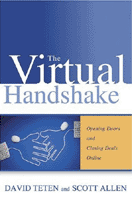Excellent guidebook for succeeding in the online world, including social networking
 The Virtual Handshake is an immensely valuable book, both as a handbook to the virtual world for the business-oriented person and as a guide to purposeful networking. I was compelled to get it after seeing David Teten speak at a conference because he spoke with authority while explaining new things clearly. Allen and Teten have done a masterful job at writing an interesting book that is full of useful information. Moreover, they succeed at providing a conceptual framework, so the reader can make use of the information. It is also a fun read. The Virtual Handshake is an immensely valuable book, both as a handbook to the virtual world for the business-oriented person and as a guide to purposeful networking. I was compelled to get it after seeing David Teten speak at a conference because he spoke with authority while explaining new things clearly. Allen and Teten have done a masterful job at writing an interesting book that is full of useful information. Moreover, they succeed at providing a conceptual framework, so the reader can make use of the information. It is also a fun read.
As a marketing executive and a management consultant (strategy) since the early 1990s, I have helped to build parts of the virtual world the authors describe. I am very familiar with the topics, and I found the book useful on two key levels:
Conceptual: The virtual world is difficult to understand conceptually because it is boundaryless and serendipitous, and the authors describe what it is enough so you can get to the point: how to interact with it to accomplish what you want. This is extremely important […]
![Bank Wins Web 0.2 Citation for Delivering "Yechsperience" [customer experience satire]](http://rollyson.net/wp-content/uploads/2007/03/webdot2-logo.png) (**Updated) Marketing Outlays Sabotaged by Sub-par Process Execution (**Updated) Marketing Outlays Sabotaged by Sub-par Process Execution
Chicago, 29 November 2006—Today, the Global Human Capital Journal awarded Grace Bank, the top three credit card issuer, its notorious Web 0.2 Citation for inducing an acute spasm of customer yechsperience™.
This citation demonstrates how exceptionally poor service destroys brand despite kind words and happy pictures from Marketing. Although Grace employed a somewhat formulaic approach, it demonstrated laudable skill at producing customer irritation and angst.
[…]
The Knowledge Economy, Ultimate Context for Understanding the Future welcomes you to the Post-Industrial World, which turns past assumptions on their heads.
 The Knowledge Economy is a post-industrial economy characterized by a highly developed information technology industry along with overproduction and commoditization in industrial and agricultural sectors. Widespread information technology (IT) adoption among producers and consumers enables all market participants to create and share information about all aspects of economic transactions. The creation, packaging and sharing of information is termed “knowledge.” In the Knowledge Economy, information about an underlying good creates most of the good’s differentiated value. The Knowledge Economy is a post-industrial economy characterized by a highly developed information technology industry along with overproduction and commoditization in industrial and agricultural sectors. Widespread information technology (IT) adoption among producers and consumers enables all market participants to create and share information about all aspects of economic transactions. The creation, packaging and sharing of information is termed “knowledge.” In the Knowledge Economy, information about an underlying good creates most of the good’s differentiated value.
Consumer mobilization and engagement in the Knowledge Economy renders many of the Industrial Economy’s rules invalid. In the Industrial Economy, consumers had little information relative to producers, they were isolated from each other, and they had no collective voice. They were at a disadvantage as market participants. The “second stage” of the Internet, “Web 2.0,” facilitates P2P (peer to peer) information sharing, and its tools are free to use and accessible to anyone with an Internet connection. Producers […]
The TransAtlantic Partnership’s Implications for U.S., E.U. Economies summarizes coverage of the EEC International Conference—Talking with the Ambassadors of the World’s Largest Trading Relationship and the CEOs of Four Global Enterprises.
 Three eminent diplomatic leaders and CEOs from Baxter, Financial Dynamics, ITW and Philips briefed Midwest executives on the current status and future directions of the world’s largest trading relationship at the Executives’ Club of Chicago’s International Conference November 15. The half-day program featured several presentations, a CEO panel and a media round table. All speakers sought to impress upon the audience the pivotal importance of the transatlantic alliance for the United States and Europe, and most warned chief executives neither to take it for granted nor to be passive in the face of rising protectionism. Three eminent diplomatic leaders and CEOs from Baxter, Financial Dynamics, ITW and Philips briefed Midwest executives on the current status and future directions of the world’s largest trading relationship at the Executives’ Club of Chicago’s International Conference November 15. The half-day program featured several presentations, a CEO panel and a media round table. All speakers sought to impress upon the audience the pivotal importance of the transatlantic alliance for the United States and Europe, and most warned chief executives neither to take it for granted nor to be passive in the face of rising protectionism.
The fact that the importance of the E.U.—U.S. alliance had to be emphasized brought into sharp relief the relatively sudden rise of Asia as well as the shift from the Industrial Economy to the Knowledge Economy. Both megatrends pose opportunities and threats for the world’s largest economies and enterprises, and […]
|
|
 The Virtual Handshake is an immensely valuable book, both as a handbook to the virtual world for the business-oriented person and as a guide to purposeful networking. I was compelled to get it after seeing David Teten speak at a conference because he spoke with authority while explaining new things clearly. Allen and Teten have done a masterful job at writing an interesting book that is full of useful information. Moreover, they succeed at providing a conceptual framework, so the reader can make use of the information. It is also a fun read.
The Virtual Handshake is an immensely valuable book, both as a handbook to the virtual world for the business-oriented person and as a guide to purposeful networking. I was compelled to get it after seeing David Teten speak at a conference because he spoke with authority while explaining new things clearly. Allen and Teten have done a masterful job at writing an interesting book that is full of useful information. Moreover, they succeed at providing a conceptual framework, so the reader can make use of the information. It is also a fun read.
![Bank Wins Web 0.2 Citation for Delivering "Yechsperience" [customer experience satire]](http://rollyson.net/wp-content/uploads/2007/03/webdot2-logo.png) (**Updated) Marketing Outlays Sabotaged by Sub-par Process Execution
(**Updated) Marketing Outlays Sabotaged by Sub-par Process Execution  The Knowledge Economy is a post-industrial economy characterized by a highly developed information technology industry along with overproduction and commoditization in industrial and agricultural sectors. Widespread information technology (IT) adoption among producers and consumers enables all market participants to create and share information about all aspects of economic transactions. The creation, packaging and sharing of information is termed “knowledge.” In the Knowledge Economy, information about an underlying good creates most of the good’s differentiated value.
The Knowledge Economy is a post-industrial economy characterized by a highly developed information technology industry along with overproduction and commoditization in industrial and agricultural sectors. Widespread information technology (IT) adoption among producers and consumers enables all market participants to create and share information about all aspects of economic transactions. The creation, packaging and sharing of information is termed “knowledge.” In the Knowledge Economy, information about an underlying good creates most of the good’s differentiated value. Three eminent diplomatic leaders and CEOs from Baxter, Financial Dynamics, ITW and Philips briefed Midwest executives on the current status and future directions of the world’s largest trading relationship at the Executives’ Club of Chicago’s International Conference November 15. The half-day program featured several presentations, a CEO panel and a media round table. All speakers sought to impress upon the audience the pivotal importance of the transatlantic alliance for the United States and Europe, and most warned chief executives neither to take it for granted nor to be passive in the face of rising protectionism.
Three eminent diplomatic leaders and CEOs from Baxter, Financial Dynamics, ITW and Philips briefed Midwest executives on the current status and future directions of the world’s largest trading relationship at the Executives’ Club of Chicago’s International Conference November 15. The half-day program featured several presentations, a CEO panel and a media round table. All speakers sought to impress upon the audience the pivotal importance of the transatlantic alliance for the United States and Europe, and most warned chief executives neither to take it for granted nor to be passive in the face of rising protectionism.